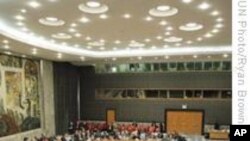<!-- IMAGE -->The U.N. Security Council has extended the mandate of the NATO-led military forces in Afghanistan for another year. The 15-member council also urged the protection of civilians and stressed the importance of building up Afghanistan's own military and police forces.
The council unanimously extended the mandate authorizing the nearly 68,000 strong International Security Assistance Force, known as ISAF, until October 13, 2010.
Speaking after the vote, British Ambassador John Sawers said the resolution stresses the importance of protecting civilians.
"This resolution goes out of its way to emphasize the importance of protecting the Afghan civilian population, which is one of the centerpieces of General [Stanley] McChrystal's approach as NATO commander on the ground," said John Sawers.
General McChrystal is the top U.S. and NATO commander in Afghanistan. He has reportedly asked President Barack Obama for an additional 40,000 U.S. troops to help defeat the Taliban.
The NATO-led ISAF has nearly 68,000 troops from 42 countries, including more than 30,000 from the United States. In addition, the United States has another 30,000 military personnel under its direct command in Afghanistan.
The Security Council resolution calls on member states to contribute personnel, equipment and other resources to the coalition so it can carry out its mandate. It also stresses the importance of expanding and improving the Afghan national army and police.
The routine rollover of the ISAF mandate Thursday comes against a backdrop of debates in Washington and other capitals about future strategy and troop commitments in Afghanistan. A sharp increase in troop casualties in recent months has led to a drop off in public support for the 8-year long war effort.
Separately, the Security Council issued a statement condemning "in the strongest terms" the suicide attack Thursday near the Indian embassy in Kabul that killed and injured dozens.
The council unanimously extended the mandate authorizing the nearly 68,000 strong International Security Assistance Force, known as ISAF, until October 13, 2010.
Speaking after the vote, British Ambassador John Sawers said the resolution stresses the importance of protecting civilians.
"This resolution goes out of its way to emphasize the importance of protecting the Afghan civilian population, which is one of the centerpieces of General [Stanley] McChrystal's approach as NATO commander on the ground," said John Sawers.
General McChrystal is the top U.S. and NATO commander in Afghanistan. He has reportedly asked President Barack Obama for an additional 40,000 U.S. troops to help defeat the Taliban.
The NATO-led ISAF has nearly 68,000 troops from 42 countries, including more than 30,000 from the United States. In addition, the United States has another 30,000 military personnel under its direct command in Afghanistan.
The Security Council resolution calls on member states to contribute personnel, equipment and other resources to the coalition so it can carry out its mandate. It also stresses the importance of expanding and improving the Afghan national army and police.
The routine rollover of the ISAF mandate Thursday comes against a backdrop of debates in Washington and other capitals about future strategy and troop commitments in Afghanistan. A sharp increase in troop casualties in recent months has led to a drop off in public support for the 8-year long war effort.
Separately, the Security Council issued a statement condemning "in the strongest terms" the suicide attack Thursday near the Indian embassy in Kabul that killed and injured dozens.




